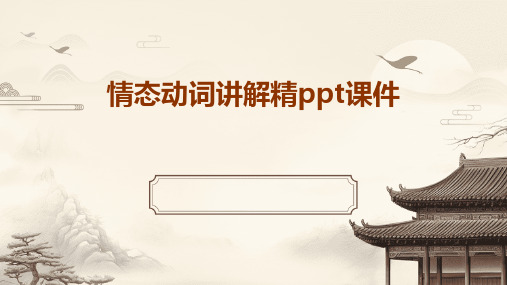2019教育情态动词及情态动词的被动语态共14张PPT数学
合集下载
情态动词的被动语态

必须
The book should be read by many people.
有必要
The book is required to be read by many people.
重要
It is essential that the book be read by many people.
表示义务或禁止
选择题解析
02
填空题解析
03
改错题解析
这道题考查的是情态动词的被动语态 。根据时间状语从句"by the time you came back"可知,主句应该用 过去完成时,表示"在你回来之前书已 经被……"。因此,正确答案为"had been"。
这道题考查的是将来时的被动语态。 根据时间状语"by the end of this year"可知,主句应该用将来时,表示 "到今年年底前项目将会被……"。因 此,正确答案为"will be completed" 。
练习题
01
02
03
选择题
The book _______ by the time you came back.
填空题
The project _______ (完 成) by the end of this year.
改错题
The letter has written (改为被动语态)
答案解析
01
表示能力或可能性
能够
The book can be read by many people.
会
The book will be read by many people.
情态动词讲解精ppt课件

例句
will/would
详细描述:will 表示现在的意愿或 预测,would 表示过去的或虚拟 的意愿或预测。
1. I will help you with your project.(我会帮助你完成你的项 目。)
总结词:表示意愿或预测
例句
2. They would have gone to the party if they had known about it earlier.(如果他们早点 知道,他们就会去参加聚会。)
表示意愿
情态动词+动词原形,如 would like to go,表示 某人想要去。
形式变化
基本形式
情态动词的基本形式包括 现在时、过去时和将来时 。
过去式
情态动词的过去式通常是 在基本形式后面加-d或ed,如could have done 、should have done等。
将来时
情态动词的将来时通常是 在基本形式后面加-will或shall,如will be able to 、shall have to等。
may与might的区别与联系
总结词
may表示现在的许可或可能性;might表示过去的可能性或许可。
详细描述
may用于肯定句中,表示许可或可能性,例如“You may use this room.”(你可以使用这个房间。 )“The book may be in the library.”(这本书可能在图书馆里。)might表示过去的可能性,常 用于过去时态的句子中,例如“He might come tomorrow.”(他明天可能来。)
未必、很难说
She might not agree with us.
表示虚拟语气
will/would
详细描述:will 表示现在的意愿或 预测,would 表示过去的或虚拟 的意愿或预测。
1. I will help you with your project.(我会帮助你完成你的项 目。)
总结词:表示意愿或预测
例句
2. They would have gone to the party if they had known about it earlier.(如果他们早点 知道,他们就会去参加聚会。)
表示意愿
情态动词+动词原形,如 would like to go,表示 某人想要去。
形式变化
基本形式
情态动词的基本形式包括 现在时、过去时和将来时 。
过去式
情态动词的过去式通常是 在基本形式后面加-d或ed,如could have done 、should have done等。
将来时
情态动词的将来时通常是 在基本形式后面加-will或shall,如will be able to 、shall have to等。
may与might的区别与联系
总结词
may表示现在的许可或可能性;might表示过去的可能性或许可。
详细描述
may用于肯定句中,表示许可或可能性,例如“You may use this room.”(你可以使用这个房间。 )“The book may be in the library.”(这本书可能在图书馆里。)might表示过去的可能性,常 用于过去时态的句子中,例如“He might come tomorrow.”(他明天可能来。)
未必、很难说
She might not agree with us.
表示虚拟语气
情态动词的被动语态课件

注意: 在否定句中一般不用 may not ,常用 can’t 表示“不可能”。例如:
He can’t be at home tonight. 今晚他不可能在家。 3. 用于特殊疑问句中,表示不确定,常可译为“会”。 如: Who may call meat night? 谁会在晚上给我打电话呢? 4. 表示希望、祈求、祝愿,常可译为“祝愿”。 如: May you have a good time. 祝你过得愉快。 May you be happy! 祝你幸福!
16. You should water the flower now.→
The flower
should be watered by you now
17.We can repair this watБайду номын сангаасh in two .
This watch can be repaired in two days
18.We should do the work as soon as possible. → The work should be done as soon as possible.
19.You must pay attention to your pronunciation→
Your pronunciation must be paid attention to (by you). 20. We can finish the work in two days. → can be finished The work in two days 21.You can dig a hole in the earth → A Hole can be dug in the earth
情态动词讲解ppt课件

1.Can this be an excuse for not giving them help? 表示惊异、怀疑、不相信 2.This can’t be true. 等态度,主要用在否定句、 3.How can you be so crazy. 疑问句和感叹句中。
考评项目赋标准分,对照考评内容和 考评办 法对考 评项目 进行考 评,评 出各考 评项目 的考评 实际得 分,考 评类目 下各考 评项目 考评实 际得分 之和为 该考评 类目的 考评实 际得分
2.表示推测时,could不是过去式,只是语气更委婉;若是推测已发生的事或过去的情况,用can/could have done
3.can和be able to辨析 can(could)和be able to都可以表示能力,意思上没有区别。但can只有现在式和过去式,而be able to则 有更多的形式。如:
考评项目赋标准分,对照考评内容和 考评办 法对考 评项目 进行考 评,评 出各考 评项目 的考评 实际得 分,考 评类目 下各考 评项目 考评实 际得分 之和为 该考评 类目的 考评实 际得分
语法 :情态动词
---Modal Verbs
考评项目赋标准分,对照考评内项目 的考评 实际得 分,考 评类目 下各考 评项目 考评实 际得分 之和为 该考评 类目的 考评实 际得分
After the accident it was a long time before she was able to walk again. The fire was very big, but most people were able to escape from the building.
I’ve always wanted to be able to speak fluent English. Those bags look really heavy, are you sure you’ll be able to carry them on your own?
被动语态 精 ppt课件

2021/3/26
被动语态 精 ppt课件
5
昨天晚上 ,夜黑风高,它又被打了。
Doudou was beaten yesterday evening.
2021/3/26
被动语态 精 ppt课件
6
明天,豆豆还会面临N顿暴打,可怜的豆豆啊。 Tomorrow ,Doudou will be beaten several times .
情被态动语动态 精词ppt课+件be+ done
12
1. They make shoes in that factory. 主 谓宾
Shoes are made (by them) in that factory.
主
谓
宾
一般现在时被动结构:
am/is /are +过去分词
Children___in China.
真题演练
• 2. Today Chinese __________ by more and more people around the world.
• A. was spoken B. is spoken
C. spoke
D. speak
• 3. The road _______ last year.
被动语态 精 ppt课件
18
• ___the trees ___in the park next
Saturday?
• A Will…be planted B Will be…planted
• C Will…plant
D Will…planted
2021/3/26
被动语态 精 ppt课件
19
真题演练
• C. spoke
情态动词-完整版PPT课件

情态动词 modal verbs
1.情态动词的用法特点
1)情态动词 除 ought 和 have 外,后面只能 接不带to 的不定式。 2)情态动词没有人称,数的变化,即情态动 词第三人称单数不加-s。 3)情态动词没有非谓语形式,即没有不定式, 分词等形式。
can could may might shall should must will would ought to
have to dare need used to
表示推测
情态动词
不表示推测
2.表示推测——情态动词的重要用法.
情态动词
对将来
对现在
对过去
m肯ust/定sho的uld 推测
+ V. + V. + have done
常见must be + be doi定的推测 can’t, couldn’t
疑问的推测
can, could
+ V.
+ V.
+ have done
+ be doing
可以用not表示“可能不”
+V.
+ V.
+ have done
+ be doing
+ V.
+ V.
+ have done
+ be doing
不同的“肯定”程度可按下列层次排列: He is at home. (事实) He must be at home.(非常肯定的推断) He ought to be at home.(很可能) He could be at home.(很可能) He may be at home.(仅仅可能而已) He might be at home.(或许, 非常不确定) He might not be at home.(也许不在家) He may not be at home. (比might可能) He couldn’t be at home.(很可能不在家) He can’t be at home.(一定不在家)
1.情态动词的用法特点
1)情态动词 除 ought 和 have 外,后面只能 接不带to 的不定式。 2)情态动词没有人称,数的变化,即情态动 词第三人称单数不加-s。 3)情态动词没有非谓语形式,即没有不定式, 分词等形式。
can could may might shall should must will would ought to
have to dare need used to
表示推测
情态动词
不表示推测
2.表示推测——情态动词的重要用法.
情态动词
对将来
对现在
对过去
m肯ust/定sho的uld 推测
+ V. + V. + have done
常见must be + be doi定的推测 can’t, couldn’t
疑问的推测
can, could
+ V.
+ V.
+ have done
+ be doing
可以用not表示“可能不”
+V.
+ V.
+ have done
+ be doing
+ V.
+ V.
+ have done
+ be doing
不同的“肯定”程度可按下列层次排列: He is at home. (事实) He must be at home.(非常肯定的推断) He ought to be at home.(很可能) He could be at home.(很可能) He may be at home.(仅仅可能而已) He might be at home.(或许, 非常不确定) He might not be at home.(也许不在家) He may not be at home. (比might可能) He couldn’t be at home.(很可能不在家) He can’t be at home.(一定不在家)
初中英语动词的时态和被动语态(共14张PPT)
延续性动词 be on be at/in+地点 be at/in+地点 be in/a member of be on have know keep
have a cold
have been to—have gone to
曾经去过(主语人在) 已经去了(主语人不在)
--I can’t find you these days.Where have you been?
be over be up be back be away (from) be here /there
非延续性动词 put on come/go to arrive/reach/get to join begin/start buy get to know borrow / lend
catch a cold
定义 表示过去某时间或某动作以前发生的动作。
结构 关健字
S+had+V过去分词
IwSr+heheaanlidzIner’det+aIVchh过ae去dd分let词hftemcoyupHnutar.sde+Sa+t Vh过om去分e词
by the time I came back,by the end of last term, when I got to the station,before he went to bed
表示过去某时刻或某阶段正在发生的动作。
was
1.SW+hawtawsna’st /hwe edroein’gt dwohinegn the UFO arrived?
结构 S+ weredoing 2W. Tahse/yWweerree+hSav+idnoginfugn…th?ese days.
关于情态动词及情态动词的被动语态课件
4.You must not plant trees in very dry earth . Trees must not be planted by you in very dry earth.
3. Sixteen-year-olds should be allowed to drive. (先改为否定句,再改一般疑问句)
People may catch fish in the river.
Fish may be caught in the riven cook delicious meals. Delicious meals can be cooked by my mother.
I don’t think the work should be done at once.
序号 原形 过去式
主要含义
1
can
2 may
could 1.能力2.请求/准许3.可能性 might 1.请求/准许2.可能性 *3.祝愿
3 must
must 1.义务(必须); 2.猜测(肯定)
had to
4 need needed
需要
5 dare
dared
敢
6
will
would
愿意
7 shall should 1.征求意见 2“应该”(should) 3
The exam can be passed (by you) if you study hard.
Can the exam be passed (by you) if you study hard?
water(浇水)
They must water trees every day. Trees must be watered by them every day. Must trees be watered by them every day?
3. Sixteen-year-olds should be allowed to drive. (先改为否定句,再改一般疑问句)
People may catch fish in the river.
Fish may be caught in the riven cook delicious meals. Delicious meals can be cooked by my mother.
I don’t think the work should be done at once.
序号 原形 过去式
主要含义
1
can
2 may
could 1.能力2.请求/准许3.可能性 might 1.请求/准许2.可能性 *3.祝愿
3 must
must 1.义务(必须); 2.猜测(肯定)
had to
4 need needed
需要
5 dare
dared
敢
6
will
would
愿意
7 shall should 1.征求意见 2“应该”(should) 3
The exam can be passed (by you) if you study hard.
Can the exam be passed (by you) if you study hard?
water(浇水)
They must water trees every day. Trees must be watered by them every day. Must trees be watered by them every day?
情态动词(共43张PPT)
A.Must; mustn't
B.Will; couldn't
C.May; can't
( C ) It's really hot in the room.You'd better
the
windows. A.not to close B.don't close C.not close
(B )
—You
drive after drinking, Simon.
—You're right.I'll take a taxi.
A.wouldn't B.shouldn't C.ought to
二、用恰当的情态动词填空。
Simon, you mmuussttnn''tt play with the knife.You mmayay
在回答以 may 提问的问句时,肯定回答一般可仍用 may 或 Yes, please./Certainly./Sure./Of course.否定回答根据说话人的语气 由强到弱分别选用: mustn't/can't/may not。 —May I watch TV? 我能看电视吗? —No, you mustn't.You must play the piano first.不,你禁止看, 你必须先弹钢琴。
need 的基本用法 意为“需要;必要”,作情态动词时常用于否定句和疑问句中。 You needn't hand in your homework tomorrow.你明天不需要 交你的作业。 Need I attend the meeting this afternoon? 我需要今天下午参 加会议吗?
初三语法专项聚集含有情态动词的被动语态课件
情态动词
包括can、may、must、should 等,用于表达说话人的主观判断 或意见。
形式
01
02
03
基本形式
情态动词+be+过去分词 ,如"The book can be read by students."
否定形式
情态动词+not+be+过去
分词,如"The
book
cannot be read by
要点二
进阶练习题2
The dishes _______ (wash) by her. (用所给动词的正确形 式填空)
高阶练习题
高阶练习题1
The homework _______ (finish) by him. (用所给动词的 正确形式填空)
高阶练习题2
The letter _______ (post) by her. (用所给动词的正确形 式填空)
情态动词+be+及物动词现在分词的用法
总结词
表示正在进行的动作,强调动作正在 进行中。
详细描述
这种用法通常用于描述正在进行的动 作,强调该动作正在发生或进行中。 例如,“The movie might be being shown now.”(电影现在可 能正在播放中。)
05
含有情态动词的被动语态的
04
含有情态动词的被动语态的
特殊用法
情态动词+be+及物动词过去分词的用法
总结词
表示推测、可能或必要的动作已经完成,强调动作的结果。
详细描述
这种用法通常用于描述过去发生的动作,强调该动作的结果或影响。例如, “The book must have been written by him.”(这本书一定是由他写的。 )
包括can、may、must、should 等,用于表达说话人的主观判断 或意见。
形式
01
02
03
基本形式
情态动词+be+过去分词 ,如"The book can be read by students."
否定形式
情态动词+not+be+过去
分词,如"The
book
cannot be read by
要点二
进阶练习题2
The dishes _______ (wash) by her. (用所给动词的正确形 式填空)
高阶练习题
高阶练习题1
The homework _______ (finish) by him. (用所给动词的 正确形式填空)
高阶练习题2
The letter _______ (post) by her. (用所给动词的正确形 式填空)
情态动词+be+及物动词现在分词的用法
总结词
表示正在进行的动作,强调动作正在 进行中。
详细描述
这种用法通常用于描述正在进行的动 作,强调该动作正在发生或进行中。 例如,“The movie might be being shown now.”(电影现在可 能正在播放中。)
05
含有情态动词的被动语态的
04
含有情态动词的被动语态的
特殊用法
情态动词+be+及物动词过去分词的用法
总结词
表示推测、可能或必要的动作已经完成,强调动作的结果。
详细描述
这种用法通常用于描述过去发生的动作,强调该动作的结果或影响。例如, “The book must have been written by him.”(这本书一定是由他写的。 )
- 1、下载文档前请自行甄别文档内容的完整性,平台不提供额外的编辑、内容补充、找答案等附加服务。
- 2、"仅部分预览"的文档,不可在线预览部分如存在完整性等问题,可反馈申请退款(可完整预览的文档不适用该条件!)。
- 3、如文档侵犯您的权益,请联系客服反馈,我们会尽快为您处理(人工客服工作时间:9:00-18:30)。
can/could not be done must not be done should not be done may/might not be done had better not be done have not to be done
疑问式:情态动词+ 主语+ be + p.p
can/could +主语 +be done must +主语 + be done should +主语 + be done may/might +主语 + be done had +主语 + better be done have +主语 + to be done
I don’t think the work should be done at once.
Drills:
1.We should look after elder people very well. 2.We should answer these questions as soon as possible. 3.We must clean our classroom this afternoon. 4.You must hand in your homework before nine o’clock. 5.You can bring your friends to my birthday party tomorrow evening. 6.You shouldn’t touch the things on display in the museum. 7.They may grow fruit trees around village next spring.
The exam can be passed (by you) if you study hard.
Can the exam be passed (by you) if you study hard?
water(浇水)
They must water trees every day. Trees must be watered by them every day. Must trees be watered by them every day?
序号 原形 过去式
主要含义
1
can
could 1.能力2.请求/准许3.可能性
2 may
might 1.请求必须); 2.猜测(肯定)
had to
4 need needed
需要
5 dare
dared
敢
6
will
would
愿意
7
shall
should 1.征求意见 2“应该”(should)
“最好” “ 宁愿”
4
含情态动词的被动语态: 情态动词+be +PP
can/could be done must be done should be done may/might be done had better be done have to be done
否定式:情态动词+not + be + p.p
4.You must not plant trees in very dry earth . Trees must not be planted by you in very dry earth.
3. Sixteen-year-olds should be allowed to drive. (先改为否定句,再改一般疑问句)
3.Parents should allow teenagers to drive the car.
Teenagers should be allowed by parents to drive the car .
Should teenagers be allowed by parents to drive the car ? 4.You can pass the exam if you study hard.
People may catch fish in the river.
Fish may be caught in the river (by people).
1.My mother can cook delicious meals. Delicious meals can be cooked by my mother.
Sixteen-year-olds shouldn’t be allowed to drive.
Should sixteen-year-olds be allowed to drive?
Yes they should./ No, they shouldn’t.
4. I think the work should be done at once. (改为否定句)
2. Students will use these textbooks next term. These textbooks will be used next term by students .
3. You should water trees often . Trees should be watered by you often .
含情态动词的被动语态
情态动词有哪些?
1. can /may/must/ will / shall / should / ought to
2. need /dare 3. had better/ would rather, used to /
have to / be able to
2
情态动词的含义
3
情态动词的含义
序号 原形
过去式
主要用法
8
be able to was/were able to
“能够”(能力)
9 have to
had to
“不得不/必须”
10 ought to
ought to
“应该”
11 used to
“ 过去(常常)”
12 had better
13 would rather
1.I can finish the work. The work can be finished by me. Can the work be finished by you?
2.We should plant many more trees. Many more trees should be planted by us. Should many more trees be planted by us?
疑问式:情态动词+ 主语+ be + p.p
can/could +主语 +be done must +主语 + be done should +主语 + be done may/might +主语 + be done had +主语 + better be done have +主语 + to be done
I don’t think the work should be done at once.
Drills:
1.We should look after elder people very well. 2.We should answer these questions as soon as possible. 3.We must clean our classroom this afternoon. 4.You must hand in your homework before nine o’clock. 5.You can bring your friends to my birthday party tomorrow evening. 6.You shouldn’t touch the things on display in the museum. 7.They may grow fruit trees around village next spring.
The exam can be passed (by you) if you study hard.
Can the exam be passed (by you) if you study hard?
water(浇水)
They must water trees every day. Trees must be watered by them every day. Must trees be watered by them every day?
序号 原形 过去式
主要含义
1
can
could 1.能力2.请求/准许3.可能性
2 may
might 1.请求必须); 2.猜测(肯定)
had to
4 need needed
需要
5 dare
dared
敢
6
will
would
愿意
7
shall
should 1.征求意见 2“应该”(should)
“最好” “ 宁愿”
4
含情态动词的被动语态: 情态动词+be +PP
can/could be done must be done should be done may/might be done had better be done have to be done
否定式:情态动词+not + be + p.p
4.You must not plant trees in very dry earth . Trees must not be planted by you in very dry earth.
3. Sixteen-year-olds should be allowed to drive. (先改为否定句,再改一般疑问句)
3.Parents should allow teenagers to drive the car.
Teenagers should be allowed by parents to drive the car .
Should teenagers be allowed by parents to drive the car ? 4.You can pass the exam if you study hard.
People may catch fish in the river.
Fish may be caught in the river (by people).
1.My mother can cook delicious meals. Delicious meals can be cooked by my mother.
Sixteen-year-olds shouldn’t be allowed to drive.
Should sixteen-year-olds be allowed to drive?
Yes they should./ No, they shouldn’t.
4. I think the work should be done at once. (改为否定句)
2. Students will use these textbooks next term. These textbooks will be used next term by students .
3. You should water trees often . Trees should be watered by you often .
含情态动词的被动语态
情态动词有哪些?
1. can /may/must/ will / shall / should / ought to
2. need /dare 3. had better/ would rather, used to /
have to / be able to
2
情态动词的含义
3
情态动词的含义
序号 原形
过去式
主要用法
8
be able to was/were able to
“能够”(能力)
9 have to
had to
“不得不/必须”
10 ought to
ought to
“应该”
11 used to
“ 过去(常常)”
12 had better
13 would rather
1.I can finish the work. The work can be finished by me. Can the work be finished by you?
2.We should plant many more trees. Many more trees should be planted by us. Should many more trees be planted by us?
